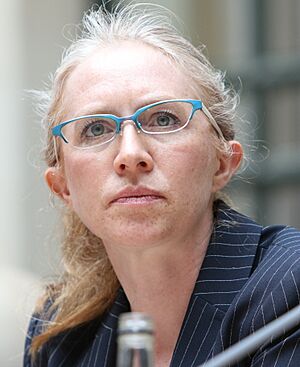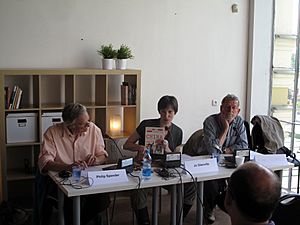Index on Censorship facts for kids
 |
|
| Formation | 1972 |
|---|---|
| Type | Non-profit |
| Headquarters | London, United Kingdom |
|
Region served
|
Worldwide |
| Trevor Phillips (Chair), Kate Maltby (Deputy Chair), Anthony Barling, Andrew Franklin, James Goode, Helen Mountfield, Ian Rosenblatt, Nick Timothy, Mark Stephens, Ruth Smeeth | |
|
Parent organization
|
Writers and Scholars International |
|
Staff
|
12 |
| Website | indexoncensorship.org |
Index on Censorship is a group that works to protect freedom of expression. This means they stand up for people's right to speak, write, and share their ideas without being stopped or punished. They publish a magazine four times a year from London, also called Index on Censorship.
This group is run by a non-profit organization called Writers and Scholars International (WSI). It's also connected to a UK charity, Index on Censorship, which used to be called the Writers and Scholars Educational Trust. Both are led by Trevor Phillips, a British TV person, writer, and former politician. The person in charge right now is Jemimah Steinfeld.
WSI was started by famous people like poet Stephen Spender, philosopher Stuart Hampshire, publisher David Astor, and writer Edward Crankshaw. The first editor of Index on Censorship was Michael Scammell, who worked there from 1972 to 1981. He is still a supporter of the organization today.
Contents
How Index on Censorship Started
An Idea from the USSR
The idea for Index on Censorship came from a letter written by two people in the Soviet Union, Pavel Litvinov and Larisa Bogoraz. They wrote "To World Public Opinion" in 1968. They described how unfair a trial was for two writers, Ginzburg and Galanskov. They asked people around the world to speak out against the trial and help the accused.
The Times newspaper in London published their letter. In response, the English poet Stephen Spender sent a short message. He said that he and other friends supported their brave actions and wanted to help. Many famous people signed this message, including poet W. H. Auden, musician Yehudi Menuhin, and philosopher Bertrand Russell.
Later that year, Litvinov suggested to Spender that a regular publication should be started in the West. This publication would share information with the world about what was really happening in the Soviet Union.
Choosing the Name and Focus
Stephen Spender and his colleagues, including Stuart Hampshire and David Astor, decided to make their new magazine's focus wider. They wanted to report on censorship not just in the Soviet Union, but also in other countries. This included places like Latin America, Greece, Spain, and Portugal, which had strict governments at the time.
The magazine was first going to be called Index. This name was a nod to historical lists of banned books, like the Roman Catholic Church's Index Librorum Prohibitorum. However, they later added "on Censorship" to the title. This was to make it clearer what the magazine was about, as "Index" alone might not have been understood by everyone.
Stuart Hampshire explained the group's goals when it started. He said they wanted to challenge rulers who hid their unfair actions. He believed there should always be public attention on places where people were held against their will. He also wanted a public record of every time free expression was stopped by a ruler.
The Magazine: Index on Censorship
The Index on Censorship magazine began in 1972. It supports free expression by publishing articles from writers worldwide. It shares stories that have been hidden and starts important discussions. The magazine also keeps a record of censorship around the globe.
Each quarterly issue often focuses on a specific country, region, or a common theme about free expression. The magazine also publishes short stories and poems by new and well-known writers.
Even though the idea for Index came from people in the Soviet Union, the magazine quickly started covering censorship everywhere. This included military governments in Latin America and dictatorships in Greece and Portugal. Over time, it also looked at other challenges to free speech, like extreme religious views, the rise of nationalism, and Internet censorship.
In the first issue in 1972, Stephen Spender wrote that the magazine would share exciting writings from censored authors. He also noted that censorship was a big topic of debate, not just in countries with strict governments. The magazine aims to highlight these challenges. It often organizes issues by theme and includes a list of recent cases of censorship and limits on freedom of the press.
Over the years, Index on Censorship has featured works by many famous writers and thinkers. These include Aleksandr Solzhenitsyn, Milan Kundera, Václav Havel, Nadine Gordimer, and Salman Rushdie.
The magazine has also explored topics like how the UK royal family handles their old documents. It has also looked at the struggles of journalists in Afghanistan and the rise of Narendra Modi. Past issues have focused on China, reports from the Middle East, and internet censorship. The January 2008 issue about Russia even won an Amnesty International Media Award.
Since 2010, the magazine has been published by SAGE Publications. Before that, from 2005 to 2009, it was published by Routledge. You can get Index on Censorship in print, through subscriptions, and on apps for phones and tablets. It is also a partner with Eurozine, a group of European cultural journals.
Important Publications
Index on Censorship has published many important works. These include Ken Saro-Wiwa's writings from prison and the first English translation of the Czechoslovak Charter 77 manifesto. They also published Alexander Solzhenitsyn's Nobel Prize acceptance speech.
The magazine shared stories of people who "disappeared" in Argentina. It also featured works by banned poets in Cuba and Chinese poets who escaped the events at Tiananmen Square protests of 1989. Index on Censorship has a long history of publishing writers in translation, like Bernard-Henri Lévy and Ma Jian. It also published news reports, such as Anna Politkovskaia's coverage of the war in Chechnya.
The play Every Good Boy Deserves Favour (1977) by Tom Stoppard was inspired by a story published in Index on Censorship. The play is about a Soviet mental institution. Stoppard later became a supporter of Index on Censorship.
The magazine published a statement from the International Committee for the Defence of Salman Rushdie. This statement supported the right of all people to express their ideas freely. Six months later, Index published a declaration from four student leaders of the Tiananmen Square protests of 1989.
Index Index, a section that listed abuses of free expression worldwide, was published in the magazine until 2008. After that, this information moved to their website. The first Index Index listed censorship in Greece, Spain, and Brazil.
Index on Censorship paid special attention to Czechoslovakia between 1968 and 1989. It dedicated an entire issue to the country in 1976. This issue included writings by Václav Havel, including a play and a letter about censorship. The magazine also covered the Czech theatre and a list of banned books that were shared secretly.
Campaigns for Free Speech
Index on Censorship has been a leader in the UK campaign to "StopSLAPPs." These are lawsuits that powerful people or companies use to silence critics. Because of Index's work, a new law was proposed in 2024 to help stop these lawsuits.
Another campaign, "Free Speech is not For Sale," highlighted the problem of "libel tourism." This is when people sue others for defamation in England because its laws are very strict. The campaign showed how this made it hard for people to speak freely. After much discussion, the UK Justice Secretary promised to make these laws fairer.
The Justice Secretary said that a free press needs to offer opinions, not just news. He was worried that big companies were using the laws to stop fair comments. He also noted that the high fees for lawyers in Britain seemed to encourage these lawsuits.
These campaigns show how Index on Censorship has worked to speak out publicly. This approach started around 2008. Before that, the organization focused more on reporting and using its knowledge to pressure governments.
Arts and International Programs
Index on Censorship also runs projects in the UK and around the world. These projects put their ideas about free expression into action. In 2009 and 2010, they worked in countries like Afghanistan, Burma, Iraq, and Tunisia. They supported journalists, artists, and writers who faced threats and censorship.
The organization's arts programs look at how social and political changes affect artists. They examine how much artists might censor themselves. They also use art to get young people involved in discussions about freedom of expression. They work with groups in the UK that are often overlooked, creating new ways for them to share their creativity.
Index on Censorship works internationally to support new creative works. This includes articles, photography, films, visual arts, and performances. For example, they had an exhibition of photo stories by women in Iraq called Open Shutters. They also worked with artists from refugee communities in the UK, connecting them with artists from their home countries. This project, Imagine art after, was shown at Tate Britain in 2007.
Index has also worked with Burmese artists and publishers living outside their country. They helped create a program to support Burma's creative community. They also commissioned a new play called Seven Years With Hard Labour. This play shared stories from former Burmese political prisoners now living in the UK. Index also helped publish a book of poetry by people experiencing homelessness in London and St. Petersburg.
Leadership
The current Chief Executive of Index on Censorship is Jemimah Steinfeld. She took on this role in May 2024. Before her, Jodie Ginsberg was the Chief Executive from 2014 to 2020.
Freedom of Expression Awards
| Freedom of Expression Awards | |
|---|---|
| Presented by | Index on Censorship |
| Location | London, United Kingdom |
| Country | |
| First awarded | 2001 |
| Last awarded | 2022 |
Index on Censorship gives out annual awards to journalists, artists, activists, and digital experts from around the world. These awards celebrate people who have made a big difference in promoting free expression over the past year. Sponsors have included The Guardian, Google, and SAGE Publications.
The 2020 awards were held online in April 2020. In 2022, the awards were presented on October 27 in London.
2022 winners: Journalism: Huang Xueqin; Campaigning: OVD-Info; Arts: Hamlet Lavastida; Trustee Award: Andrey Kurkov.
2021 winners: Journalism: Samira Sabou; Campaigning: Abdelrahman 'Moka' Tarek; Arts: Tatyana Zelenskaya; Trustee Award: Arif Ahmed.
2020 winners: Journalism: OKO.press; Campaigning: Sayed Ahmed Alwadaei, Veysel Ok; Digital: 7amleh; Arts: Yulia Tsvetkova.
2019 winners: Journalism: Mimi Mefo; Campaigning: Cartoonists Rights Network, International; Digital: Fundación Karisma; Arts: Zehra Doğan.
2018 winners: Journalism: Wendy Funes; Campaigning: Egyptian Commission for Rights and Freedoms; Digital: Habari RDC; Arts: The Museum of Dissidence.
2017 winners: Journalism: Maldives Independent; Campaigning: Ildar Dadin; Digital: Turkey Blocks; Arts: Rebel Pepper.
2016 winners: Journalism: Zaina Erhaim; Campaigning: Bolo Bhi; Digital: GreatFire; Arts: Murad Subay.
2015 winners: Journalism: Rafael Marques de Morais and Safa Al Ahmad; Campaigning: Amran Abdundi; Digital:Tamas Bodoky; Arts: Mouad "El Haqued" Belghouat.
2014 winners: Journalism: Azadliq; Advocacy: Shahzad Ahmad; Digital: Shu Choudhary; Arts: Mayam Mahmoud.
2013 winners: Journalism: Kostas Vaxevanis; Digital Freedom: Bassel Khartabil; Advocacy: Malala Yousafzai; Arts: Zanele Muholi.
2012 winners: Journalism: Idrak Abbasov; Advocacy: Bahrain Centre for Human Rights, collected by Nabeel Rajab; Innovation: Freedom Fone by Kubatana; Arts: Ali Ferzat; 40th Anniversary Award: Research and Information Centre "Memorial (society)" St Petersburg.
2011 winners: Journalism: Ibrahim Eissa; Advocacy: Gao Zhisheng; New Media: Nawaat; Arts: M. F. Husain; Special Commendation: Belarus' Prisoners of Conscience, collected by the Belarus Free Theatre.
2010 winners: Journalism: Radio La Voz; Advocacy: Rashid Hajili; Publishing Award: Andalus Press; New Media Award: Twitter; Freemuse Award: Mahsa Vahdat; Special Commendation: Heather Brooke.
2009 winners: Journalism: The Sunday Leader – Sri Lanka; Film: Ricki Stern and Anne Sundberg, The Devil Came on Horseback; New Media: Psiphon; Books: Ma Jian, Beijing Coma; Law: Malik Imtiaz Sarwar.
2008 winners: Journalism: Arat Dink and Agos magazine; Mohamed Al-Daradji and Ahlaam; New Media: Julian Assange and WikiLeaks; Books: Francisco Goldman, The Art of Political Murder; Law: U Gambira and the Monks of Burma.
2007 winners: Journalism: Kareem Amer; Film: Yoav Shamir, Defamation; Whistleblower: Chen Guangcheng; Books: Samir Kassir; Law: Siphiwe Hlophe.
2006 winners: Journalism: Sihem Bensedrine; Film: Bahman Ghobadi, Turtles Can Fly; Whistleblower: Huang Jingao; Books: Jean Hatzfeld, Into the Quick Life: The Rwandan Genocide – the Survivors Speak and A Time for Machetes: the Killers Speak; Law: Beatrice Mtetwa.
2005 winners: Journalism: Sumi Khan; Books: Soldiers, Light by Daniel Bergner; Film: Final Solution, Rakesh Sharma; Campaigning: Center of Constitutional Rights; Whistleblowing: Grigoris Lazos.
2004 winners: Journalism: Kaveh Golestan; Music: West–Eastern Divan Orchestra; Whistleblowing: Satyendra Dubey; Film: Amamdla! by Lee Hirsch; Books: Slave by Mende Nazer and Damien Lewis; Special: Mordechai Vanunu; Censor of the Year: John Ashcroft.
2003 winners: Journalism: Fergal Keane; Whistleblowing: Tony Kevin; Censor of the Year: Jonathan Moyo; Circumvention of Censorship: Al Jazeera; Defence of Free Expression: Hashem Aghajari.
2002 winners: Defence of Free Expression: Anna Politkovskaya; Circumvention of Censorship: Şanar Yurdatapan; Whistleblowing: Jiang Weiping; Censor of the Year: Silvio Berlusconi.
2001 winners: Defence of Free Expression: Mashallah Shamsolvaezin; Whistleblowing: Grigory Pasko; Circumvention of Censorship: Lorrie Cranor, Avi Rubin and Marc Waldman; Censor of the Year: UK Ministry of Defence (MoD).
See also
 In Spanish: Index on Censorship para niños
In Spanish: Index on Censorship para niños
 | George Robert Carruthers |
 | Patricia Bath |
 | Jan Ernst Matzeliger |
 | Alexander Miles |




